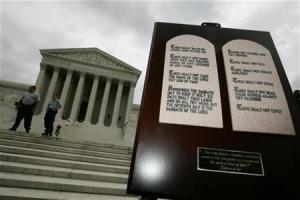Why Jesus says He loves us but allows tragedy in our lives

When people tell me it’s too hard for them to memorize Scripture, I always point them to John 11:35. It’s the shortest verse in the Bible: “Jesus wept.”
Everyone can memorize those two words, which are pretty much the same over a variety of translations. It’s such a simple sentence that there aren’t that many different ways to translate it. But in those two words are some profound lessons about our faith.
This specific verse appears in the story of the death and resurrection of Lazarus from John 11:1-44. Here’s a quick summary:
Jesus was out teaching when his friends Mary and Martha sent word that their brother, Lazarus, was very ill. Instead of heading out immediately to help His friend, Jesus waited a couple of days before returning to Bethany, where the family lived. By the time He finally got there, Lazarus had already died and been buried.
When Jesus arrived, Mary said, “Lord, if only you had been here, my brother would not have died. But even now I know that God will give you whatever you ask” (John 11:21-22 NLT). She had faith that there was still hope for her brother. Jesus told her “I am the resurrection and the life” and that Lazarus would rise again at the Last Day. Still, Jesus saw Mary and others from the community weeping over the death of Lazarus.
Verse 33 is especially descriptive: “When Jesus saw her weeping and saw the other people wailing with her, a deep anger welled up within him, and he was deeply troubled” (John 11:33 NLT). Jesus went to the tomb where Lazarus had been buried — that’s when “Jesus wept”— and then asked for the stone to be removed. He prayed to God, then commanded Lazarus to come out. Lazarus emerged from the tomb still wrapped in his burial clothing.
Lazarus was alive, and many came to faith in Jesus as a result.
There are several things we can learn from this story.
What to do in a crisis
Mary and Martha were facing a personal crisis. Their brother was deathly ill. They didn’t know what to do so they called on Jesus. And it’s interesting to me the way they called on Him. They didn’t invite Him to their home or even ask Him anything. They just told Him that Lazarus was sick and assumed that Jesus, as their friend, would respond appropriately.
We should always bring our troubles to Jesus. James 4:2 says, “you do not have because you do not ask” (NKJV).
In fact, this is a pattern we see all throughout the Bible.
When the Israelites entered the desert after passing through the Red Sea, they spent days without any water. The people complained and began to turn against Moses. So, Moses brought his problem to God and “cried out to the Lord for help” (Exodus 15:25 NLT).
In Jerusalem, King Hezekiah received a threatening letter about the Assyrian army heading his way. It was a pivotal moment for the Kingdom of Judah, and all Hezekiah knew to do was turn it over to God. “He went up to the Lord’s Temple and spread [the letter] out before the Lord” (Isaiah 37:14 NLT).
In the New Testament, after Herod Antipas beheaded John the Baptist, the disciples “went and told Jesus what had happened” (Matthew 14:12 NLT).
That’s what we need to do when trouble comes. We need to set it before God. We need to bring it to Jesus. Scripture tells us He is “our refuge and strength, a very present help in trouble” (Psalm 46:1 NKJV).
But notice the basis of Mary and Martha’s appeal. They asked Jesus for help not because they had fed Him and the disciples many times in their home, or because they felt Jesus owed them something. They said, “Lord, your dear friend is very sick” (John 11:3 NLT). In other translations, it says, “he whom you love is sick.” They appealed to His love.
His perfect timing
The most surprising thing for most of us in reading the story of Lazarus is Jesus’ slow response. He stayed where he was for the next two days before telling His disciples, “Let’s go back to Judea” (John 11:7 NLT). Why did He wait? The Bible makes it clear that Jesus loved this family. Because of this, we might have expected this verse to say, “Now, Jesus loved Martha and Mary and Lazarus and found the fastest horse and rode full speed to get to His sick friend.” Or for that matter, being God, Jesus could have just materialized there, right? But He didn’t do that.
He waited. He delayed His arrival to Bethany. Why? Because He loved Lazarus! That sounds like a contradiction. If Jesus really loved him, why didn’t He go immediately to heal him?
When we face hardship or tragedy in our lives, we have the same questions. If Jesus really loves me, why did He let this happen? It’s hard to see through eyes filled with tears. But the point is this: Even though we cannot see how a situation will resolve or why it has come upon us, we can know it flows from the love of God and is controlled by Him.
Besides, His delays are not necessarily His denials. Ecclesiastes 3:11 says, “He has made everything beautiful in its time” (NKJV). Jesus came late to Lazarus, but He was looking at the big picture. Mary and Martha had their eyes on the immediate moment. We’re focused on the small picture — on what will make us happy and comfortable now. But the eyes of God are on eternity. His focus is on what will make us holy, draw us closer to Him, and strengthen us spiritually.
Mary and Martha must have been frustrated when Jesus missed the funeral. Martha even went out to meet Jesus as He arrived, bringing her devastation with her. She said, “Lord, if only you had been here, my brother would not have died” (NLT). Those were pretty brash words. Mary, for what it’s worth, didn’t even leave the house.
You’ve probably felt that way. Maybe a spouse of many years passed away. Maybe your business failed. Maybe your parents divorced or your children have gone astray. And so, you ask, “Where were you, Lord?”
Even Jesus cried out, “My God, My God, why have You forsaken Me?” during His anguish on the cross (Matthew 27:46 NKJV). It’s not wrong to verbalize our questions. It’s not wrong to bring our doubts to the Lord. There’s nothing wrong with asking God “why?” as long as we don’t do it with the idea that God somehow owes us an answer.
In fact, when Martha questioned Jesus, He did not correct her. He just pointed her toward the eternal perspective: “I am the resurrection and the life. Anyone who believes in me will live, even after dying. Everyone who lives in me and believes in me will never ever die. Do you believe this, Martha?” (John 11:25-26 NLT). His timing had an intentional, eternal component that Martha could not see. Jesus knew that hope grows strongest in the garden of pain.
Jesus weeps with us
Finally, this story shows us that Jesus, in all His power and glory, fully understood our pain and our sorrows. Jesus wept for the death of His friend. Jesus had empathy toward the grieving family. Jesus knew, completely, what they were going through.
In a prophecy written long before Jesus arrived, the prophet Isaiah described Him this way: “He was despised and rejected — a man of sorrows, acquainted with deepest grief” (Isaiah 53:3 NLT). I like the way The Message translates this passage: “He was looked down on and passed over, a man who suffered, who knew pain firsthand. One look at him and people turned away. We looked down on him, thought he was scum. But the fact is, it was our pains he carried — our disfigurements, all the things wrong with us.”
He carried our weaknesses. Our sorrows weighed Him down. We turned our backs on Him.
Jesus knows what it is like to suffer. He walked in our shoes and then some. He willingly subjected Himself to the limitations and pain of the human experience and voluntarily put Himself in the way of danger as He bore our sorrows on the cross.
Jesus felt every bit of the pain we feel. Why would He do this? Hebrews 2 says, “For this reason he had to be made like them, fully human in every way, in order that he might become a merciful and faithful high priest in service to God, and that he might make atonement for the sins of the people” (Hebrews 2:17 NIV). Jesus entered into every detail of human life. He experienced all of it Himself — all the pain, all the trauma, all the temptation — in order to save us.
In John 11:38, some translations say Jesus was “disturbed” (NRS) or “angry” (NLT) as He arrived at the tomb of Lazarus. He was mad! You might say He experienced righteous anger — not toward the mourners or toward Mary and Martha, but toward death itself. He understood what a loss it was for them, and by bringing Lazarus back from the dead, brought good out of the human suffering He understood all too well.
Deep valleys
This story reassures me. I have personally faced suffering and enormous loss. I have gone through moments when I asked, “Where were you, Lord?” But the answer is always right there in front of me. Jesus was present when my son Christopher was born on April 1, 1975, and He was also present when my son left this world far too early on July 24, 2008. He joined me in my joy and joined me in my sorrow.
There will never be a valley so deep that God won’t walk through it with us. All of us know our journeys through life will take us through some dark valleys. That’s the nature of being human. We will have to face hardship. But He will sustain us in our hour of need, and the suffering of a Christian can always be a powerful testimony to a lost world.
He is with us during every moment of crisis. He understands our pain. We will have our good days and bad days, and He knows what those are like. And though we can’t always see His eternal timing, we can rest on His promise:
"When you pass through the waters, I will be with you;
And through the rivers, they shall not overflow you.
When you walk through the fire, you shall not be burned,
Nor shall the flame scorch you” (Isaiah 43:2 NKJV).
Greg Laurie is the pastor and founder of the Harvest churches in California and Hawaii and Harvest Crusades. He is an evangelist, best-selling author and movie producer. “Jesus Revolution,” a feature film about Laurie’s life from Lionsgate and Kingdom Story Company, releases in theaters February 24, 2023.




























